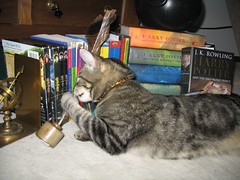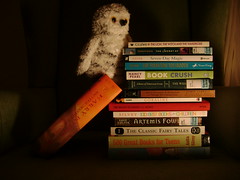The New York Times has an interesting piece on Rowling’s attempt to stop the publication of the Harry Potter Lexicon, based on the website of the same name. Needless to say, the internet has transformed the cultural background of copyright law. As Lessig put it in the article, if claims like Rowlings’ are valid, the web is turning out a “whole generation of criminals.”
I’d be interested to read some specifics about the HPL’s approach, and Rowling’s charges there. In legal arguments over copyright, details matter. Commentary and criticism are one thing; excessive copying is another.
From the website, it seems that long quotations are rare or absent, and that many of the entries are synthetic or analytical in nature. Some of the essays, like “Wizard Banking” or “British Schooling in the 1970s?” read like those deadly mini-articles from the Transactions of the American Philological Society. And can anyone claim that the analytical and speculative “Religion in the Wizarding World” isn’t protected?
One of the key notions of US copyright law is the distinction between fact and expression. At its most basic, this means that you can write about the dimensions of the pyramids or the life of JFK, but you can’t describe them in the same words as I did. In this way, nobody “owns” a fact, no matter how much trouble it took to collect or how interesting it is. It doesn’t even have to be a true fact. It just has to intend or purport to be one.
When it comes to fiction, however, the line is blurry. That J. K. Rowling wrote a series of books about a character named Harry Potter is certainly a fact. But where do we draw the line? Is it a fact that, as the HPL explains, the diadem of Ravenclaw is “etched with the words, ‘Wit beyond measure is man’s greatest treasure.'”? The diadem doesn’t exit. It’s a product of Rowling’s imagination. And does it matter that the HPL uses “etched with the words” and Rowling used “there were tiny words etched into it”?
I would love to see the fact-expression extended to cover “literary facts,” to allow authors to write about Albus Percival Wulfric Brian Dumbledore as they would JFK—stick to the facts and avoid pulling a Doris Kearns Goodwin. Unfortunately, that’s not where the law is.
Hat tip: David Weinberger.












 librarything.com) to claim your prizes! Oh, and include your LT user names so I can update this post with the right attributions…
librarything.com) to claim your prizes! Oh, and include your LT user names so I can update this post with the right attributions…
